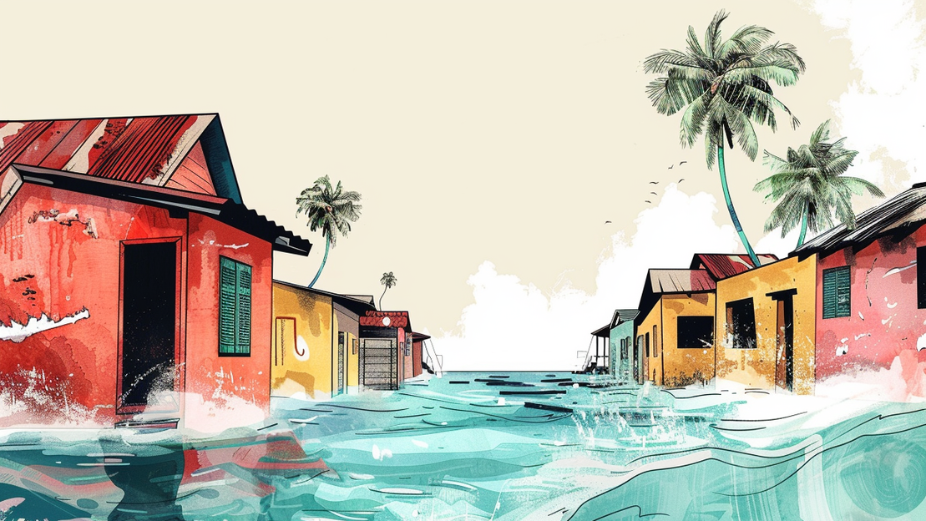
In the global fight against climate change, a notable shift is occurring: many countries are increasingly focusing on adaptation and mitigation rather than prevention. This shift is particularly alarming for low-lying small island developing states (SIDS) such as the Maldives, where rising sea levels and extreme weather events pose existential threats. The global politics surrounding climate change, shaped largely by the interests of major polluting nations, leaves countries like the Maldives in a precarious position, forcing them to confront the consequences of a crisis they did little to cause.
The Global Shift Towards Adaptation
The emphasis on adaptation over prevention is not merely theoretical but is reflected in the actions and policies of various nations. For instance, countries like the United States, Australia, and India have made significant investments in climate adaptation strategies. In the United States, federal spending on disaster recovery and climate resilience projects has increased substantially, with a focus on building infrastructure that can withstand the impacts of climate change rather than aggressively reducing emissions. Similarly, Australia has prioritised adaptation measures such as coastal defences and drought management over significant emission cuts, especially under previous administrations that have been criticised for their lack of commitment to global climate agreements.
India, while also pursuing renewable energy initiatives, has focused heavily on climate adaptation, particularly in agriculture and water management, to cope with the impacts of climate change on its vast and vulnerable population. These cases illustrate a broader trend where adaptation, rather than prevention, is becoming the dominant approach, driven by political and economic realities that make aggressive emission reductions challenging.
The Politics of Climate Change and Its Impact on the Maldives
For the Maldives, a nation with an average elevation of just 1.5 meters above sea level, the shift towards adaptation by major polluting countries presents a grave challenge. The Maldives is particularly vulnerable to the impacts of climate change, including rising sea levels, increased storm intensity, and coral bleaching, and drastic changes in the monsoons. However, the international response to climate change, characterised by inadequate commitments from major polluters, exacerbates the vulnerability of small island states.
The Paris Agreement, while a milestone in international climate diplomacy, has seen uneven commitment levels. The withdrawal and lacklustre participation of key nations have undermined global efforts to limit temperature rise to 1.5°C above pre-industrial levels, a threshold critical for the survival of low-lying nations like the Maldives. Despite the Maldives’ negligible contribution to global greenhouse gas emissions, it faces some of the most severe consequences. This disparity highlights the injustice at the heart of global climate politics and reinforces the need for the Maldives to prioritise adaptation strategies.
Adaptation Strategies for the Maldives
Given the global trend towards adaptation, the Maldives must focus on strategies that enhance its resilience. Coastal protection is a critical area where the Maldives has already undertaken significant projects, such as the construction of sea walls and artificial islands, to protect against rising sea levels. The capital city, Malé, is encircled by a sea wall that has become a model for other vulnerable regions. However, these efforts must be scaled up and expanded to other atolls.
Climate-resilient infrastructure is another key area of focus. As extreme weather events become more frequent, it is essential that the Maldives invest in infrastructure that can withstand these conditions. This includes elevating buildings, constructing flood-resistant housing, and ensuring that critical facilities such as hospitals and power plants are protected from climate impacts. Additionally, the Maldives must diversify its economy. The nation’s heavy reliance on tourism, which is highly susceptible to climate change, poses significant risks. Diversifying into sectors such as renewable energy and sustainable fisheries can reduce this vulnerability and create new economic opportunities.
Furthermore, the Maldives should strengthen its international advocacy efforts. As a small nation, the Maldives has been a vocal advocate for stronger global climate action. Continuing to lead initiatives within forums such as the Alliance of Small Island States (AOSIS) can help maintain pressure on major polluters to fulfil their commitments.
The Importance of Climate Finance for SIDS
For adaptation strategies to be effective, the Maldives requires significant financial support. Unfortunately, global climate finance directed towards SIDS like the Maldives has been woefully inadequate. Although SIDS contribute less than 1% of global greenhouse gas emissions, they receive only a small fraction of global climate finance. In 2019, out of the USD 100 billion pledged to developing countries, only USD 1.5 billion was directed towards SIDS. This level of support is grossly insufficient given the scale of the challenges these nations face.
To ensure that SIDS like the Maldives can implement necessary adaptation measures, climate finance must be strategically and effectively directed. This includes not only increasing the overall amount of funds available but also ensuring that these funds are accessible and targeted to the specific needs of SIDS. This can involve prioritising projects that enhance coastal protection, build resilient infrastructure, and diversify economies. Additionally, mechanisms such as debt-for-climate swaps, where a portion of national debt is forgiven in exchange for commitments to invest in climate resilience projects, offer innovative ways to finance adaptation.
The Green Climate Fund (GCF), which is the largest multilateral climate fund, has been pivotal in supporting adaptation projects in SIDS. However, the process of accessing these funds often remains cumbersome, with many SIDS lacking the capacity to navigate complex application procedures. To address this, the international community must streamline the processes and build the capacity of SIDS to secure and effectively utilise climate finance.
The Case for Prevention: Why We Cannot Give Up
While adaptation is essential, it is equally critical to stress that prevention should not be abandoned. The shift towards adaptation might seem pragmatic in the short term, but it is ultimately a reactive approach that does not address the root causes of climate change. Prevention, particularly through the reduction of greenhouse gas emissions, remains the most effective long-term strategy to combat climate change and protect vulnerable nations like the Maldives.
Prevention is vital because adaptation has its limits. There are thresholds beyond which adaptation becomes increasingly difficult or even impossible. For the Maldives, this could mean reaching a point where rising sea levels and extreme weather events render large parts of the country uninhabitable, regardless of how much adaptation has been undertaken. By focusing solely on adaptation, we risk locking ourselves into a future where the impacts of climate change are so severe that they cannot be managed.
Moreover, prevention is a matter of global justice. The Maldives and other SIDS contribute the least to global emissions, yet they are among the most affected by climate change. A failure to commit to prevention is a failure to uphold the principles of fairness and responsibility that underpin international climate agreements. It is essential that the international community does not lose sight of the need to reduce emissions and limit global warming to levels that allow all nations, especially the most vulnerable, to survive and thrive.
The economic case for prevention is also compelling. While adaptation measures can be costly, the long-term costs of unmitigated climate change are far greater. Studies have shown that the economic impacts of climate change, including damage to infrastructure, loss of agricultural productivity, and increased health costs, will far exceed the costs of taking preventive action today. For countries like the Maldives, which depend heavily on tourism and fisheries, the economic losses from climate change could be devastating.
The Human Capacity for Adaptation
The preference for adaptation over prevention reflects a broader aspect of human nature. Historically, humans have excelled at adapting to immediate challenges rather than preventing future ones. This tendency is evident in how societies have responded to environmental changes over millennia. From the development of agricultural practices in response to climate shifts to the construction of flood defences in response to rising water levels, human ingenuity has often focused on adapting to, rather than preventing, environmental changes.
However, while adaptation is essential, it is not a panacea. For the Maldives, adaptation must go hand in hand with continued efforts to advocate for global prevention measures. The survival of the Maldives depends not only on its ability to adapt but also on the international community’s willingness to address the root causes of climate change.
Path Forward
The global shift towards adaptation rather than prevention presents significant challenges for small island states like the Maldives. As major polluters opt for strategies that allow them to live with the impacts of climate change, countries like the Maldives must invest heavily in adaptation to ensure their survival. Coastal protection, resilient infrastructure, economic diversification, and strong international advocacy are critical components of this strategy. While adaptation reflects a historical tendency of humans to respond to immediate threats, the Maldives must continue to push for global action that addresses the root causes of climate change.
Prevention remains the most effective strategy for securing a livable future for all nations. The international community cannot afford to abandon efforts to reduce emissions and limit global warming. The Maldives, while adapting to the realities of climate change, must also continue to lead the charge for global prevention efforts. In a world where the big polluters are not as committed as they should be, the Maldives must navigate this complex landscape with resilience, innovation, and a steadfast commitment to the principles of fairness and justice that demand collective action against climate change.











